Bladder Cancer Treatment Winnipeg
Treat Bladder Cancer With Up-To-Date Techniques At Our Winnipeg Clinic
Bladder cancer is a serious condition that requires prompt and effective treatment to improve outcomes and enhance quality of life. Despite this, you need to find the treatment option that’s right for you. Blood in the urine may be one of the first signs, and early detection is critical.
Here are the three main benefits of bladder cancer treatment at Men’s Health Clinic Manitoba:
- Rapid assessments
- Customized treatment plan
- Improved quality of life
- Smooth road to recovery
Personalized care and evidence-based interventions are essential when treating bladder cancer. Our team of experienced healthcare professionals is dedicated to guiding you through every step of your treatment journey, from diagnosis to recovery. Stay informed and empowered as we explore the various treatment options for bladder cancer and the importance of regular screening of your bladder. Discover how Men’s Health Clinic Manitoba can support you in your fight against this disease, ensuring that you receive the care and attention you need.
Surgical Treatment Options
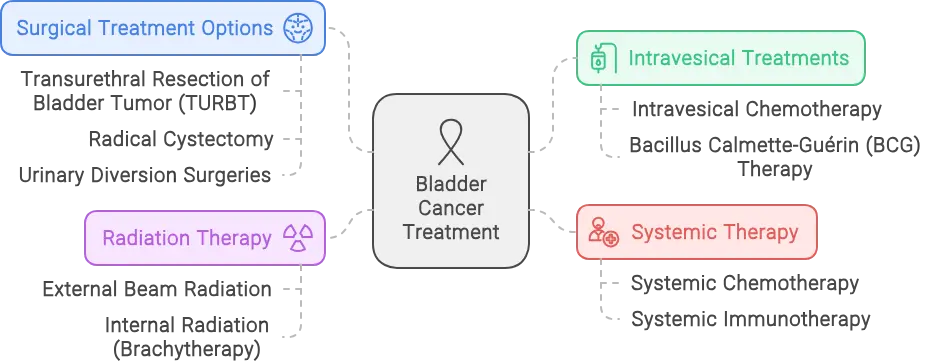
Surgical procedures are often a cornerstone of bladder cancer treatment, aimed at removing cancerous tissue and preventing the spread of the disease.
Here are some common surgical treatment options for bladder cancer:
Transurethral Resection of Bladder Tumor (TURBT)
TURBT is a minimally invasive procedure for removing tumours from the bladder lining. During TURBT, a cystoscope is inserted through the urethra, allowing the surgeon to visualize and remove cancerous tissue using specialized instruments. This is typically the first step required to establish a diagnosis and can also be the curative treatment for patients with non-muscle invasive disease.
Radical Cystectomy
Radical cystectomy involves the surgical removal of the entire bladder, as well as nearby lymph nodes and surrounding tissues. In some cases, nearby organs, such as the prostate or uterus, may also be removed. This procedure is often recommended for individuals with muscle-invasive bladder cancer or when other treatments have been unsuccessful. Additionally, when performing a radical cystectomy, it is essential to consider the potential impact on other nearby organs. This underscores the importance of comprehensive prostate cancer treatment and screening to detect any issues early, ensuring that patients receive the most appropriate and effective care for their condition.
Urinary Diversion Surgeries
Following a radical cystectomy, urinary diversion surgeries may be performed to create a new way for urine to leave the body. Common types of urinary diversion include ileal conduit, continent urinary diversion (such as Indiana pouch or neobladder), and continent cutaneous diversion (such as Kock pouch or Mainz pouch). After bladder removal, these procedures aim to maintain urinary continence and quality of life.
Intravesical treatments for Bladder Cancer
Intravesical Chemotherapy
Intravesical chemotherapy involves administering chemotherapy drugs directly into the bladder through a catheter. This approach is commonly used for non-invasive bladder cancer, where the tumour is confined to the inner lining of the bladder (superficial bladder cancer). Intravesical chemotherapy helps reduce the risk of cancer recurrence and progression by targeting cancer cells in the bladder lining.
Bacillus Calmette-Guérin (BCG) Therapy
BCG therapy is a form of immunotherapy used to treat non-muscle invasive bladder cancer (NMIBC). It involves instilling a weakened form of the tuberculosis bacterium (BCG) directly into the bladder. BCG therapy stimulates the immune system to attack and destroy cancer cells in the bladder lining, reducing the risk of cancer recurrence and progression.
Take the first step towards bladder cancer treatment today by scheduling a consultation with our experienced Men’s Health Clinic Manitoba team. Your health and well-being are our top priorities, and we’re here to support you every step of the way.
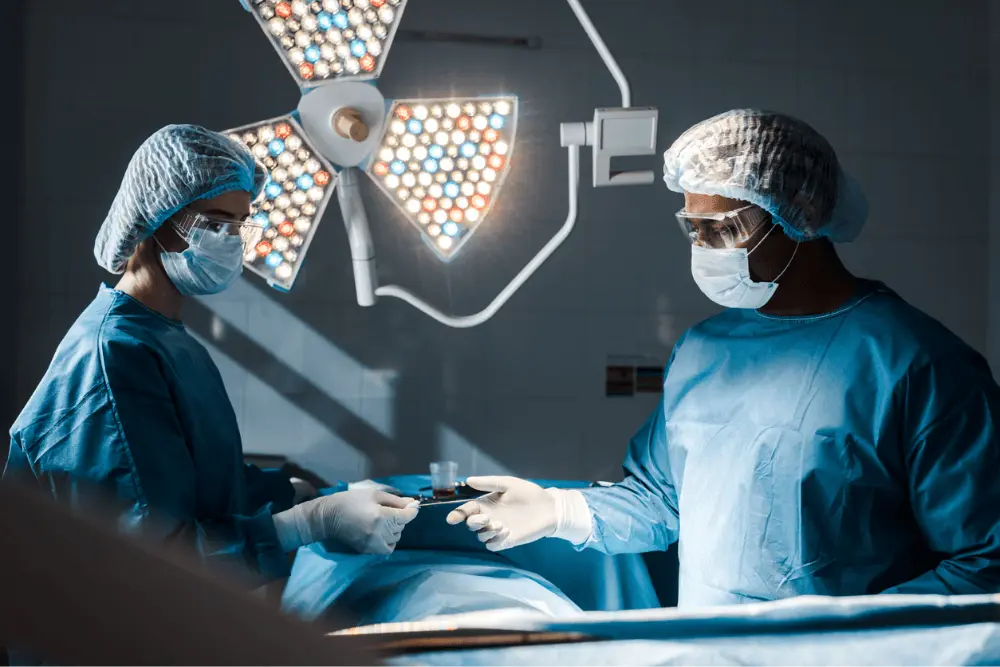
Systemic therapy for Bladder Cancer
Systemic Chemotherapy
Systemic chemotherapy involves administering chemotherapy drugs into the bloodstream, where they can travel throughout the body to reach cancer cells. It may be used to treat invasive bladder cancer that has spread to other parts of the body (metastatic bladder cancer) or as adjuvant therapy following surgery to remove the bladder (adjuvant chemotherapy). Systemic chemotherapy can help shrink tumours, control the spread of cancer, and improve symptoms and quality of life.
Systemic Immunotherapy
Immunotherapy is a cancer treatment that harnesses the body’s immune system to recognize and attack cancer cells. It has emerged as a promising treatment option for bladder cancer, particularly for individuals with advanced or metastatic disease. Checkpoint inhibitors are a type of immunotherapy that targets proteins called checkpoints, which regulate immune responses. By blocking these checkpoints, checkpoint inhibitors help activate the immune system to recognize and attack cancer cells. Checkpoint inhibitors approved for the treatment of bladder cancer include pembrolizumab, atezolizumab, and nivolumab.
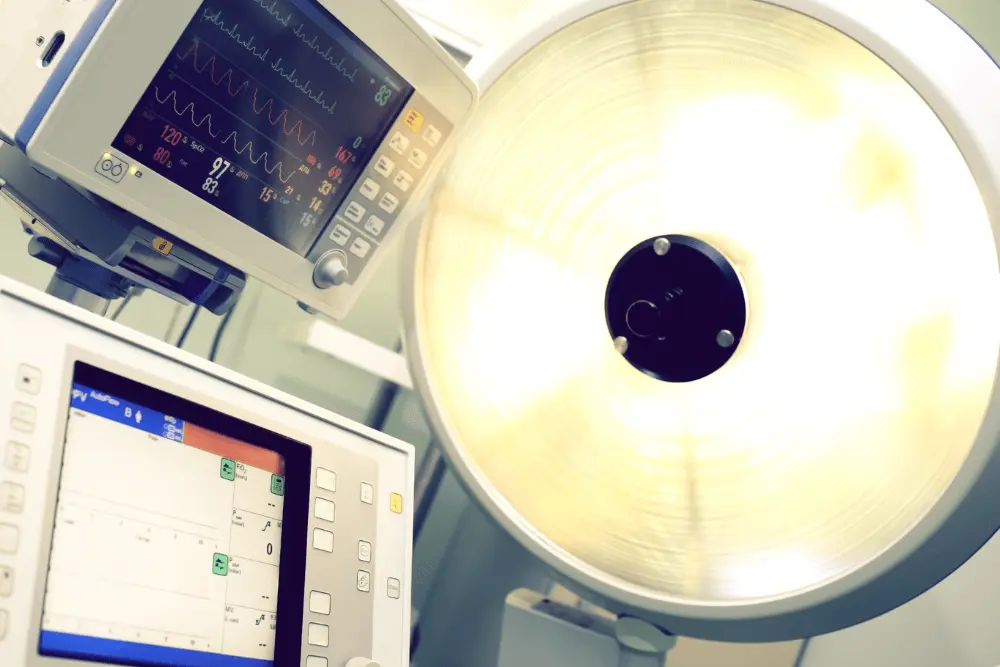
Radiation Therapy for Bladder Cancer
Radiation therapy uses high-energy beams to target and destroy cancer cells. It may be used as a primary treatment for bladder cancer, particularly for individuals who are not candidates for surgery or who wish to preserve bladder function. Radiation therapy may also be combined with other treatments, such as surgery or chemotherapy, to improve outcomes.
Here’s an overview of radiation therapy for bladder cancer:
External Beam Radiation Therapy (EBRT)
EBRT is the most common type of radiation therapy used for bladder cancer. During EBRT, a machine delivers radiation beams outside the body to the tumour and surrounding tissues. Treatment is typically administered over several weeks, with daily sessions lasting a few minutes each. EBRT is often used to treat invasive bladder cancer or as adjuvant therapy following surgery to remove the bladder.
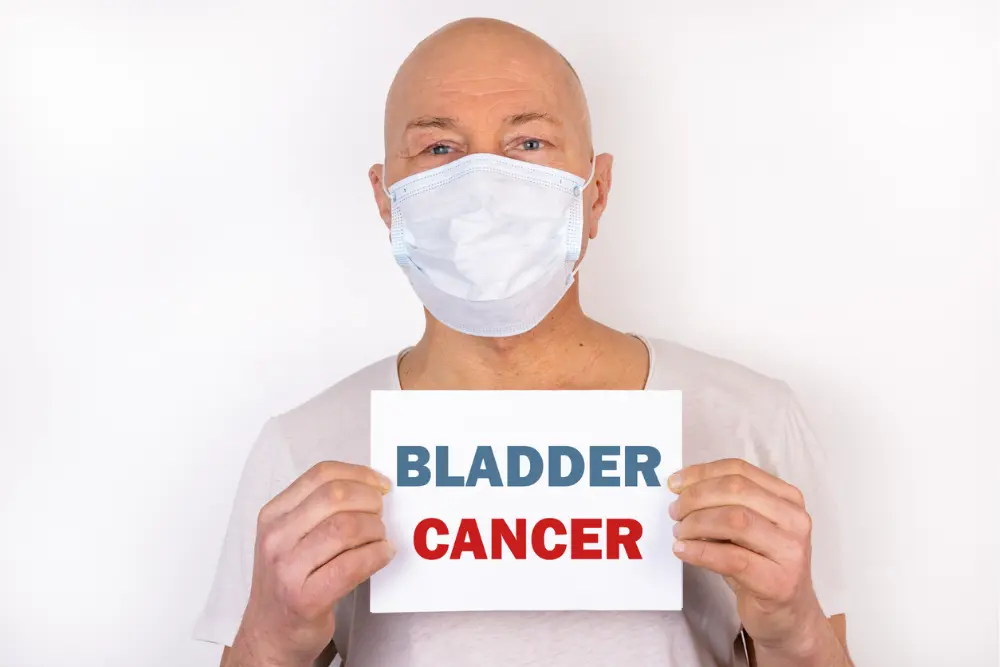
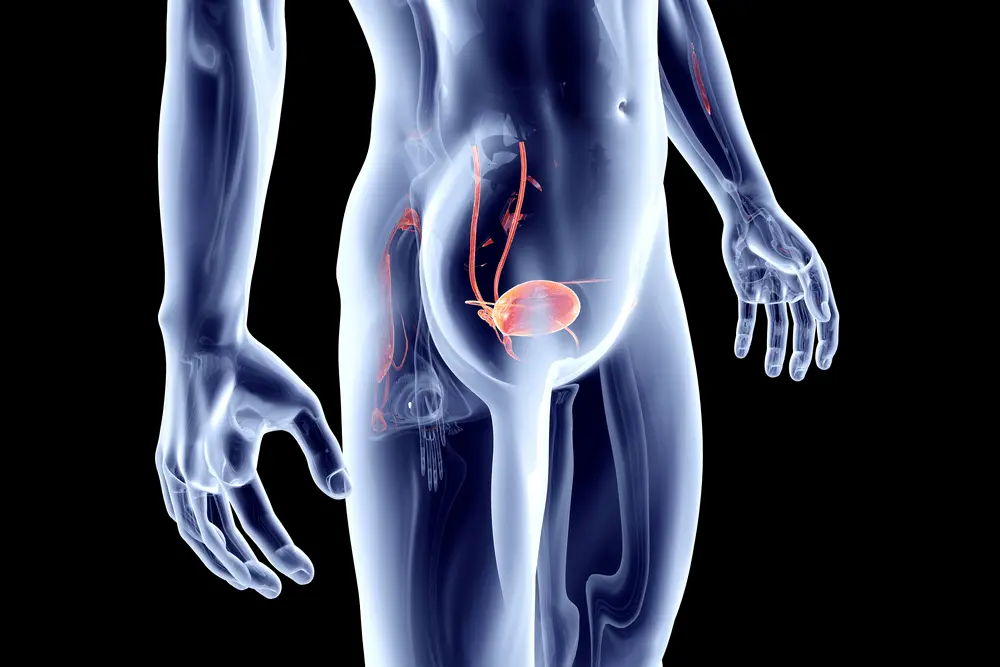
Treatment Highlights
Treatment Options for Bladder Cancer
Effective treatment for bladder cancer depends on the type and stage of the cancer, as well as the patient’s overall health and preferences. Men’s Health Clinic Manitoba offers a range of treatment options to suit each patient’s needs.
Surgery
Chemotherapy
Immunotherapy
Radiation Therapy
Support and Survivorship
A bladder cancer diagnosis is scary, but you don’t have to face it alone. Our team provides comprehensive support and guidance throughout your bladder cancer journey. If you are looking for more information, we encourage you to visit: https://bladdercancercanada.org/en/ which has additional patient resources.
Compassionate Bladder Cancer Care:
Facing bladder cancer can be daunting, but you’re not alone. At Men’s Health Clinic Manitoba, our team of experts is dedicated to providing you with the highest quality care and support throughout your bladder cancer journey. All treatment recommendations are evidenced based. If you or a loved one is dealing with bladder cancer, don’t hesitate to reach out to us. Schedule a consultation today to learn more about our comprehensive bladder cancer treatment options and take the first step toward a brighter, cancer-free future.
FAQs of Bladder Cancer Treatment Winnipeg

Treatment options for bladder cancer may include surgery, chemotherapy, radiation therapy, immunotherapy, targeted therapy, and integrative and supportive therapies. The choice of treatment depends on factors such as the stage and aggressiveness of the cancer, as well as the individual's overall health and preferences.
The most appropriate treatment for bladder cancer depends on several factors, including the stage and grade of the tumour, the presence of genetic mutations, the individual's overall health and medical history, and personal preferences. Discussing your options with your healthcare team to develop a personalized treatment plan that meets your unique needs is essential.
The side effects of bladder cancer treatment vary depending on the type of treatment and individual factors. Common side effects may include fatigue, nausea, vomiting, hair loss, changes in bowel or bladder function, and immune-related adverse events (with immunotherapy). Your healthcare team will monitor your progress and help manage any side effects that arise during treatment.
The duration of bladder cancer treatment varies depending on the type and stage of cancer, the chosen treatment modalities, and individual response to treatment. Some treatments, such as surgery or chemotherapy, may be completed relatively quickly, while others, such as immunotherapy or targeted therapy, may require ongoing or periodic treatment over a longer period.
During bladder cancer treatment, you can expect to undergo various diagnostic tests, treatments, and follow-up appointments as recommended by your healthcare team. Treatment plans may involve multiple modalities, such as surgery followed by chemotherapy, radiation therapy, or a combination of treatments. Your healthcare team will provide guidance and support throughout your treatment journey, addressing any questions or concerns.
